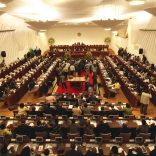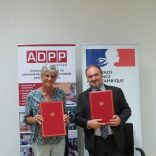Mozambique: Trade Union expects minimum-wage raise but is "aware" of difficulties - Watch
IMF insists on more information on Ematum, Proindicus, MAM

File photo
A team from the International Monetary Fund (IMF), led by Michel Lazare, an assistant director to the IMF’s public financial management division, left Mozambique on Wednesday, after a visit lasting a fortnight, without any promises of a new IMF programme.
As in all recent IMF statements on Mozambique, it was clear that the resumption of normal relations depends on concluding the audit of the three security related companies that took out loans of over two billion dollars from European banks (Credit Suisse and VTB of Russia) in 2013 and 2014, but are now effectively bankrupt.
The loans were only possible because they were fully guaranteed by the previous Mozambican government, led by President Armando Guebuza. The government guarantees were illegal since they violated the ceiling on guarantees established in the 2013 and 2014 budget laws.
The government agreed to an independent audit of the three companies, Ematum (Mozambique Tuna Company), Proindicus and MAM (Mozambique Asset Management), which was undertaken by Kroll Associates, reputedly the world’s foremost forensic auditing company.
But the Kroll audit was undermined by the management of the companies who concealed information, thus making it impossible to ascertain what had happened to all the money.
In late June, the Attorney-General’s Office (PGR) published the executive summary of the Kroll audit report, which accused the management of Ematum, Proindicus and MAM of failing to cooperate and concealing information. The man who is the chairperson of all three companies, Antonio do Rosario, a senior officer in the State Intelligence and Security Service (SISE), openly boasted of refusing to hand over data, on the grounds of “national security”, and even of expelling the auditors from his office.
The main challenge in completing the audit, Kroll said, “was the lack of information available from the Mozambique companies. Kroll spent a considerable amount of time requesting and liaising with representatives of the Mozambique companies to obtain information and documentation that was, in some case, either ultimately incomplete or not provided at all”.
Since June there has been no sign of any attempt by the three companies, or by the PGR, to improve matters. Indeed the PGR has not even posted the full audit report on its website, even though it is readily available on the Internet.
Stonewalling has not worked with the IMF. An IMF statement issued on Thursday on the initial findings of Lazare’s team said “regarding the follow up to the audit of Ematum, Proindicus and MAM companies, the mission reiterates the need to fill the information gaps in the audit report”.
The mission added, however, that it took note “of the Government’s recommendation to wait for the outcome of the ongoing investigations by the Prosecutor General Office”. The government has used the PGR investigations as its excuse for inaction, since, under the separation of powers, the executive cannot interfere in criminal investigations.
Lazare’s mission had a radically different view of Mozambique’s economic prospects to that of the government. The government’s estimate for this year’s growth in GDP is 5.5 per cent, and it forecasts growth of 5.3 per cent in 2018. But the IMF claims that growth is continuing to slow. The statement says “growth is now expected to decline to about 3 percent in 2017, compared to 3.8 percent in 2016”.
There is no explanation as to why, after lengthy consultations with senior government officials, there is such discrepancy in growth estimates.
The IMF accepts the government figures showing that annual inflation had dropped to about seven per cent by November. It believed that this, plus the stabilisation of the Mozambican currency, the metical, would allow the Bank of Mozambique to re-assess the pace of reducing the benchmark interest rates.
Lazare’s team approved of the government’s elimination of subsidies on fuel and wheat flour but claimed that “significant spending pressures stemming from debt service and wages, as well as weaker-than-anticipated revenue collection are expected to result in an overall fiscal deficit exceeding eight percent of GDP”.
It welcomed government attempts to tackle the fiscal deficit, but called for the elimination of VAT (Value Added Tax) and other tax exemptions that “could help mobilize additional revenues” and for “reducing current expenditure, while protecting outlays to social and infrastructure spending”.
The VAT exemptions are largely on basic foods. While the standard rate of VAT is 17 per cent, basic foodstuffs are zero rated. Removing these exemptions would hit the poorest and most vulnerable sectors of Mozambican society, contradicting the IMF’s declared poverty reduction aims.
The IMF also urged the government “to take decisive steps to strengthen the business environment and to restructure financially-weak state owned enterprises that pose significant fiscal and financial sector risks”.
It commended the government for submitting a draft law on public companies to parliament (although it has not yet been scheduled for debate) and for approving a decree on the regulatory framework for public debt and guarantees. It encouraged the government “to continue developing its action plan to strengthen governance, transparency, and accountability”.
Also Read: Watch: U.S. businessman may invest in Ematum – AIM report













Leave a Reply
Be the First to Comment!
You must be logged in to post a comment.
You must be logged in to post a comment.